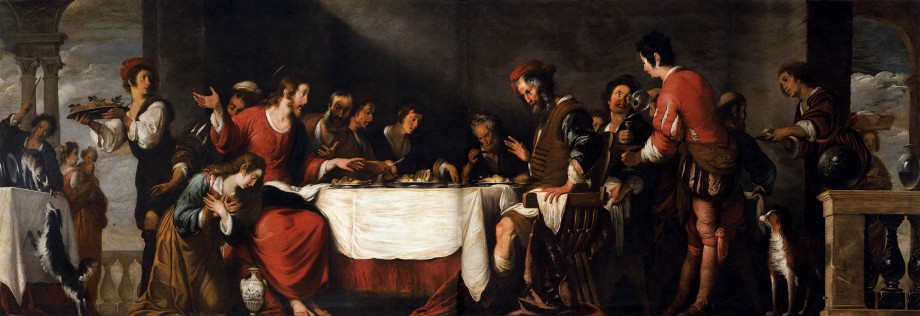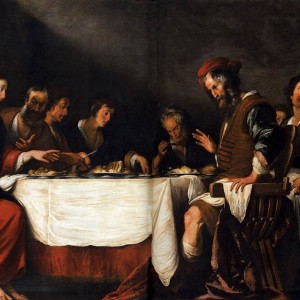
I love this Gospel [Luke 7:36-50, the Gospel from yesterday]. I love how bluntly St. Luke introduces the repentant woman, by saying, “Now, there was a sinful woman in the city.” He doesn’t beat around the bush. And you know, there are a lot of sinful men and women in the church today. I don’t just mean the person next to you, I mean you, and I mean me.
That term “sinner,” it sort of stings, doesn’t it? We don’t want to remember all of the times we’ve fallen short of the glory of God? We like looking back on our “Greatest Hits,” as it were, not our “Greatest Misses,” not our “Blooper Reel.”
So it’s easy to relate to both of the people in today’s Gospel: we know what it is to sin in an embarrassing way; but we also know what it is to forget that we’re sinners, and to turn our noses up and judge when other people sin. Simon’s not the center of the Gospel today, but he’s the one I want to talk about today.
The Gospel today is from St. Luke, and he’s the only one who records this beautiful story. But the other three Evangelists, Matthew, Mark, and John, all mention another instance, roughly three years later, in which Christ is again anointed in the house of Simon, this time, in preparation for death.
St. Mark records that second banquet this way (Mark 14:3): “And while he was at Bethany in the house of Simon the leper, as he sat at table, a woman came with an alabaster jar of ointment of pure nard, very costly, and she broke the jar and poured it over his head.”
Did you catch that detail? The man called “Simon the Pharisee” in Luke’s Gospel is apparently the same man known in Matthew and Mark’s Gospel as “Simon the Leper.” Now, obviously, they’re not suggesting that Simon had leprosy while he was hosting a dinner party. They’re suggesting that, apparently, this is a man was a leper who was miraculously healed by Christ.
So Simon knows what it’s like to face the scorn and stigma from society, to be alienated and looked down upon. It’s only when he forgets this, when he goes from leper to Pharisee, that he’s able to turn up his nose at the broken and repentant woman on his floor.
And Christ constantly warns us about acting in this Pharisaical way. For example, the parable about the servant who was forgiven a huge debt, but then refused to forgive his neighbor a small debt. The Master says to that man, “You wicked servant! I forgave you all that debt because you besought me; and should not you have had mercy on your fellow servant, as I had mercy on you?” (Matthew 18:32-33).
We need to be constantly on guard against this: wanting to be forgiven while refusing to forgive others. Every day, when we pray the Our Father, we ask God to “forgive us our trespasses as we forgive those who trespass against us.” If we refuse to forgive others, we’re asking God to hold us to our own unforgiving standard.
This is a hard message, because it’s hard to forgive others when we’ve been hurt. Jesus recognizes it. When He introduces the Our Father, this is the only one part He feels the need to explain. But He doesn’t say “forgive, unless it’s hard.” He says, “if you forgive men their trespasses, your heavenly Father also will forgive you; but if you do not forgive men their trespasses, neither will your Father forgive your trespasses” (Matthew 6:14-15).
So how do we learn to forgive those who have hurt us? A good starting place is to remember that we’re sinners, too. Christ begins to work on Simon by gently reminding him that he’s like a man who’s been forgiven a debt of “fifty day’s wages.” That’s a large debt. So that’s what I want to leave you with today: we forgive because we want to be forgiven, and we forgive because we’ve been forgiven.
This is the last of three practice homilies that I prepared this week as part of my preparation for the priesthood. I realize that this is a different format from the sort of blogging that I normally do, so I’d love to hear your feedback? Should I keep posting homilies, as they’re drafted? Or would you prefer for me to keep with the long-form blogging that I normally do around these parts?

I’d love to see more of your homilies! I’d also love it if you would keep up with your longer writings too, those were what I came to this blog for.
I appreciate the message here, and it is one that convicts me as I will outwardly forgive but my heart does not feel it.
Keep up the homilies, they are a good reflection of theology. I may be teaching the Book of Job soon for example. An observer would have a better idea of my theology by what I teach. Otherwise, it is easy to get caught into minutia.
I just went to an excellent conference yesterday, where a very devout and holy priest spoke on the most effective way to conquer any addiction or spiritual difficulty. And he said that he spoke from long experience hearing the confessions of countless souls, many with horrendous and difficult vices which they battled, and some to the point of despair and even thinking about, or attempting, suicide. Some of these we methamphetine addicts, others pornography addicts, and others were in similar pits of addictions of one type or the other. And he also said that so many of these same never overcome these same addictions and sins.
But, he noted, that the ones who do, are the ones who attach themselves to the the Lord in the Holy Eucharist. In almost any circumstance of difficulty, he said, if the people will commit themselves to both holy confession, and also the frequent reception of Jesus Christ in the Holy Eucharist, that these were the people who in his experience who overcame their previous grievious vices, and addictions. And he noted that some of these addictions were so strong that the people who went to Holy Communion daily, would even fall back to their former sins, if they missed for only a few days. But those who stayed very close to Jesus in the Blessed Sacrament, and received Holy Communion on a daily basis, in his experience, were the ones who triumphed in the end, and lived very happy and devout lives.
He also said that Jesus gave us this most effective remedy for sin for this very purpose. That is why the Eucharist is associated with food and spiritual sustenance.
So, for a habit of anger also, this is a supreme remedy. It might take time, but little by little the graces that Christ provides by remaining close to Him in His ‘body, blood, soul and divinity’ in the reception of Holy Eucharist is the most effective means(in this priests long experience with penitent souls), of maintaining the grace and strength to escape from any type of spiritual, or demonic, pit that we have fallen into.
I thank the Lord for providing HIMSELF as our remedy against every vice and wile of Satan. And we should all take advantage of this holy and effective means that Jesus Himself provides for us, and even instructs us to ask for, when He says to pray: “Give us this day our daily bread…. and lead us not into temptation, but deliver us from evil.” This ‘daily’ Bread, indeed, delivers us from many vices and sins.
We have to approach the Lord’s body and blood in a worthy matter, though. So, in some sense we have to not be partaking in continuous sins to attain its benefits. Otherwise, it is actually hazardous.
Agreed. This is what spiritual direction and Confession are all about. And the Eucharist should never be received in a state of Mortal Sin. But, if relapses happen, confession is again needed, and then more prayer, vigilance and Holy Communion. The Liturgy of the Hours…psalms throughout the day at specific periods, is also a help. This is what the Desert Fathers practiced, as well as all Catholic monks and nuns, today. So, ‘penance’ is needed to fight serious vices, addictions and sins.
But with these tools/sacraments that the Church has used for 2000 years now, a better chance than ever is provided those who would accept a little ‘discipline’ in their lives. I guess that’s maybe why Jesus called His disciples….’disciples’? 🙂
Joe,
Can I say I like both? I suppose I prefer the longer form. I get a lot out of them, but I do enjoy these shorter homilies thrown in there. I will pray for your formation and vocation. Regards!
Ditto.
How did “trespass” come to be in the vernacular version of the Our Father when it seems the correct translation of the Latin would be “debts.”
I’ve been inspired and educated by everything I’ve read on your blog. Keep them coming! God bless!
I would love to see this homily expanded. How about an explanation of what forgiveness is. If someone has lied and cheated you, then what does forgiveness mean? Do you treat them the same as you did before they hurt you, even if they have not repented of their sin? Or do you forgive them and wait for them to ask for your forgiveness before you accept them back into your life? Do you forgive them and pray for them but don’t have a relationship with them again? How is forgiveness applied to ordinary life? Do we become a doormat for others? How do you know you have forgiven someone? I am confused as to just what forgiveness means.
Glorious day, Bro Joe,
Thank you for your work and may God Bless always you and your Vocation. I think both your formats are valuable and you should continue both as the Paraclete moves you. I will try to keep in my heart that I’d still be a Leper if not for the Mercy of our Lord God; may this notion help me become more forgiving. Pax Christi.
The Lord bless thee, and keep thee.
Benedicat tibi Dominus et custodiat te
The Lord shew his face to thee, and have mercy on thee.
Ostendat Dominus faciem suam tibi et misereatur tui
The Lord turn his countenance to thee, and give thee peace.
Convertat Dominus vultum suum ad te et det tibi pacem
Numbers 6:24-26, DR
“if you forgive men their trespasses, your heavenly Father also will forgive you; but if you do not forgive men their trespasses, neither will your Father forgive your trespasses” (Matthew 6:14-15).
How does this scripture square with the very common Protestant doctrine of OSAS, ‘Once Saved Always Saved’? Isn’t there a glaring contradiction here?
I guess there’s some sort of ‘free pass’ that is believed in by OSAS Christians?